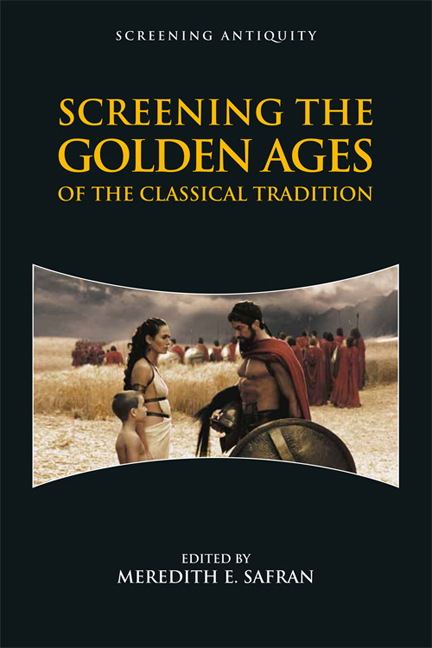Book contents
- Frontmatter
- Contents
- Series Editors’ Preface
- Editor's Acknowledgments
- Contributors
- Illustrations
- Abbreviations
- Introduction: Searching for Gold in an Age of Iron
- PART I THE GLORY THAT WAS GREECE
- 1 Re-(en)gendering Heroism: Reflective Nostalgia for Peplum's Golden Age of Heroes in Hercules: The Legendary Journeys 2.14 (1996)
- 2 Kissed by the Muse of Roller-Disco: Utopia versus the Golden Ages of America, Hollywood, and Classical Myth in Xanadu (1980)
- 3 Gilding American History through Song Culture in O Brother, Where Art Thou? (2000)
- 4 A Leonidas for the Golden Age of Superhero Films: The Thermopylae Tradition in 300 (2006)
- 5 The Dueling Greek Golden Ages of 300: Rise of an Empire (2014)
- 6 Confronting the Ancient Greek Golden Age in Jules Dassin's Phaedra (1962)
- 7 Pericles, Cincinnatus, and Zombies: Classicizing Nostalgia in The Walking Dead (2010–)
- PART II THE GRANDEUR THAT WAS ROME
- Filmography
- Bibliography
- Index
1 - Re-(en)gendering Heroism: Reflective Nostalgia for Peplum's Golden Age of Heroes in Hercules: The Legendary Journeys 2.14 (1996)
from PART I - THE GLORY THAT WAS GREECE
Published online by Cambridge University Press: 23 November 2019
- Frontmatter
- Contents
- Series Editors’ Preface
- Editor's Acknowledgments
- Contributors
- Illustrations
- Abbreviations
- Introduction: Searching for Gold in an Age of Iron
- PART I THE GLORY THAT WAS GREECE
- 1 Re-(en)gendering Heroism: Reflective Nostalgia for Peplum's Golden Age of Heroes in Hercules: The Legendary Journeys 2.14 (1996)
- 2 Kissed by the Muse of Roller-Disco: Utopia versus the Golden Ages of America, Hollywood, and Classical Myth in Xanadu (1980)
- 3 Gilding American History through Song Culture in O Brother, Where Art Thou? (2000)
- 4 A Leonidas for the Golden Age of Superhero Films: The Thermopylae Tradition in 300 (2006)
- 5 The Dueling Greek Golden Ages of 300: Rise of an Empire (2014)
- 6 Confronting the Ancient Greek Golden Age in Jules Dassin's Phaedra (1962)
- 7 Pericles, Cincinnatus, and Zombies: Classicizing Nostalgia in The Walking Dead (2010–)
- PART II THE GRANDEUR THAT WAS ROME
- Filmography
- Bibliography
- Index
Summary
In the opening moments of “Once a Hero” (1996), Episode 2.14 of the television series Hercules: The Legendary Journeys (1995–9; henceforward HTLJ), the merchant Falafel resolutely attempts to sell his merchandise to Hercules. “Buy a souvenir to remember your visit to Argos!”, he urges. “I have actual strands of the golden fleece!” Hercules politely declines, but Falafel will not be dissuaded: “A model of the Argo! Detailed replica of the famous ship that carried Jason and his crew on their quest!” With a wry smile, Hercules dryly remarks, “I've already seen it.” This exchange cheekily acknowledges that “Once a Hero” functions as a kind of sequel to the voyage of the Argo in Greek myth, with some of the Argonauts, including Hercules, reuniting in their former leader Jason's palace on the tenth anniversary of their return to Greece with the golden fleece. The fleece is soon stolen, however, and the Argonauts, led by Jason – assisted and mentored by Hercules – set out on a second expedition to retrieve it.
Yet “Once a Hero” is not just a rehash of the first voyage, for Jason's circumstances have changed for the worse. Now a morose alcoholic reeling over his ex-wife Medea's murder of their children, Jason is consumed with self-pitying delusions of supernatural persecution. The fleece is a tangible symbol of Jason's heroism and the specific construction of masculinity that HTLJ promotes as inextricably linked with it. By regaining the fleece during the episode, he will become the titular “hero” once again: a version of classical heroism refracted through the peplum, or “sword and sandal,” film, a cinematic genre that informed the sensibilities of the generation to which HTLJ's creators belonged. Yet HTLJ's nostalgic backward glance at the peplum genre's depiction of masculinity does not mean that “Once a Hero” is slavishly devoted to the past represented by those films. While depicting its Medea as the femme fatale common to peplum films, HTLJ's creative staff responds to “the decade of ‘girl power’ and riot grrrls” of the 1990s by creating a new female Argonaut, Phoebe.
- Type
- Chapter
- Information
- Screening the Golden Ages of the Classical Tradition , pp. 27 - 43Publisher: Edinburgh University PressPrint publication year: 2018



